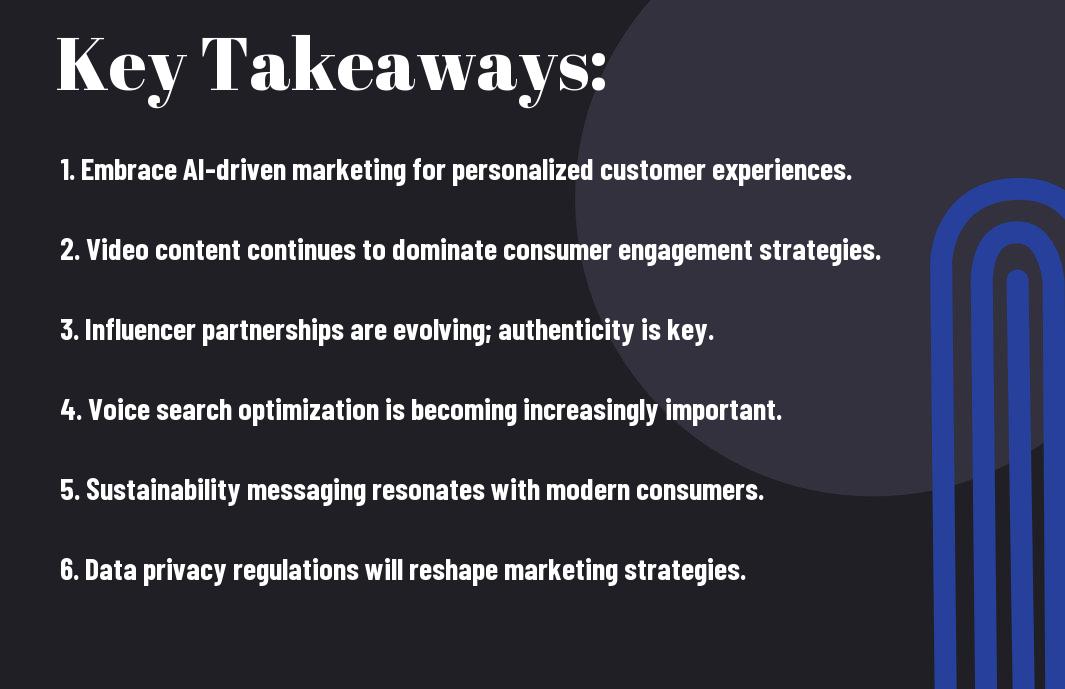
Over the past few years, digital marketing has transformed significantly, and staying ahead of emerging trends is imperative for your business success. As technology evolves, so do consumer preferences, ensuring that you remain competitive requires a keen understanding of the directions the industry is heading. In this post, we’ll explore the key trends you need to watch, providing insights and actionable strategies to help you navigate the future of digital marketing effectively. Get ready to adapt and thrive in an ever-changing landscape!

The Rise of Artificial Intelligence in Marketing
Your marketing strategies are about to undergo a significant transformation with the rise of artificial intelligence (AI). This technology is not just a passing trend; it is reshaping how brands interact with consumers, streamline processes, and make data-driven decisions. As AI continues to evolve, you will find innovative applications that enhance customer experience and improve campaign effectiveness, leading you to achieve greater results in your marketing efforts.
Personalization through AI
For marketers, leveraging AI enables a new level of personalization that was previously unimaginable. By analyzing vast amounts of consumer data, AI can help you create tailored experiences for your audience, ensuring that your messages resonate. This individualized approach enhances customer satisfaction and loyalty, making your brand more relevant in a crowded marketplace.
AI-driven Analytics and Insights
Above all, AI-driven analytics provides you with valuable insights that can inform your marketing strategies. This technology can sift through large data sets rapidly, uncovering trends and patterns that may go unnoticed by traditional methods, allowing you to make informed decisions.
The integration of AI in analytics transcends mere data processing; it empowers you to predict customer behaviors and preferences with impressive accuracy. By harnessing these insights, you can refine your marketing campaigns, allocate resources more effectively, and identify new opportunities for growth. This forward-thinking approach enables you to stay ahead of your competition and foster deeper connections with your audience, ultimately driving higher conversions and business success.
Voice Search and Smart Speakers
It’s necessary to recognize that voice search and smart speakers are reshaping how consumers interact with digital content. As more individuals turn to their devices for information, marketers must adapt to this shift by optimizing their strategies accordingly. With the growing prevalence of virtual assistants like Alexa and Google Assistant, your approach to targeting customers must evolve to fit a voice-driven landscape.
Impact on SEO Strategies
Against the backdrop of rising voice search usage, traditional SEO strategies may no longer suffice. To effectively reach your audience, it’s important to focus on natural language and query-based content. You should prioritize long-tail keywords and formulate FAQs that align with common voice queries to enhance your visibility in voice search results.
Voice Commerce Opportunities
To harness the full potential of voice technology, you must consider the exciting opportunities in voice commerce. This approach allows consumers to make purchases quickly and conveniently through voice commands, thus streamlining the shopping experience. You can engage with potential buyers directly through smart speakers, offering tailored recommendations and promotions based on their preferences.
Voice technology is paving the way for an engaging and seamless purchasing journey. By integrating your e-commerce platforms with voice-enabled features, you create a frictionless experience that enhances customer satisfaction. Consider offering voice-activated shopping capabilities or personalized suggestions that respond to voice inquiries, tapping into this growing trend and positioning your brand for success in the future of commerce.
Video Marketing Evolution
Not only has video marketing become an imperative tool for brands, but its evolution continues to reshape the digital landscape. As technology advances, you can expect to see increasingly innovative formats, including interactive videos and 3D content that engage your audience at a deeper level. Investing in video marketing will be key to connecting with consumers who demand more visually dynamic and emotionally resonant experiences.
Live Streaming Trends
Any brand looking to make a significant impact should consider the emergence of live streaming as a powerful marketing tool. Live broadcasts allow you to connect with your audience in real-time, fostering community and engagement. Whether you’re hosting Q&A sessions, product launches, or behind-the-scenes looks, leveraging live streaming can enhance your brand’s authenticity and visibility in a crowded marketplace.
Short-form Video Content
Shortform video content has taken the digital marketing world by storm, capturing your audience’s attention in concise snippets. Platforms like TikTok and Instagram Reels emphasize brevity, presenting opportunities for your brand to create engaging and memorable messages. With the average viewer’s attention span diminishing, embracing this format is imperative for compelling storytelling that converts viewers into customers.
In fact, short-form videos cater to your audience’s desire for quick, entertaining content that is easy to digest. With the ability to deliver impactful messages within seconds, this format encourages creativity and spontaneity. As you explore short-form video, consider leveraging user-generated content and trends to establish authenticity and drive engagement. Incorporating this approach into your marketing strategy can elevate your brand’s presence and connect with consumers who prefer fast-paced, visually appealing media.
Augmented Reality (AR) and Virtual Reality (VR)
After experiencing rapid technological advancements, augmented reality (AR) and virtual reality (VR) are poised to significantly shape the future of digital marketing. These immersive technologies offer new ways for you to engage with your audience, providing unique opportunities to present your products and services in interactive formats. With the growing accessibility of AR and VR tools, your brand can create memorable experiences that resonate with consumers, setting you apart in a crowded marketplace.
Enhancing Customer Experience
Along with providing an exciting new dimension to marketing, AR and VR enhance your customer experience by allowing for immersive product interactions. Imagine your customers trying on clothes virtually or visualizing how furniture fits in their homes before making a purchase. Such experiences not only increase engagement but also foster trust and satisfaction, ultimately driving conversions.
Innovative Advertising Strategies
Strategies utilizing AR and VR can redefine your advertising efforts by creating unforgettable brand experiences that engage consumers on a personal level. From virtual showrooms to interactive advertisements, these innovative approaches allow you to bring your products to life like never before.
Innovative advertising strategies leveraging AR and VR can change the way you connect with your audience. By using AR apps, your customers can visualize products in their real-world space, which simplifies the decision-making process. VR experiences can transport users into a virtual world related to your brand, creating emotional connections that traditional advertising methods struggle to achieve. Additionally, utilizing gamification techniques within these platforms encourages consumers to interact with your brand while having fun, significantly increasing brand loyalty and engagement.
Social Media Marketing Trends
All businesses must keep an eye on emerging trends in social media marketing, as platforms continue to evolve and influence consumer behavior. From short-form video content to interactive posts, your brand’s ability to adapt to these changes will determine its success in connecting with audiences. Understanding what resonates with your target demographic on various platforms will enhance your marketing strategies and foster deeper engagement.
Social Commerce Growth
The rise of social commerce is transforming how consumers discover and purchase products online. As social media platforms integrate shopping features, you can create seamless experiences that link your content directly to your ecommerce store. This growth means you should leverage features like shoppable posts and live streams to enhance your sales opportunities and engage your audience effectively.
Influencer Marketing Evolution
After years of reliance on social media influencers, the landscape of influencer marketing is evolving rapidly. As consumers become more discerning, it’s crucial to focus on authentic partnerships and micro-influencers who resonate with niche audiences. This shift allows you to foster genuine connections and drive more meaningful engagement with your brand message.
Even in this changing environment, the core principles of influencer marketing remain vital: trust, authenticity, and relatability. To adapt, you should prioritize building long-term relationships with influencers who align with your brand values and engage with their communities. As followers become more invested in influencer content, leveraging genuine endorsements will enhance your brand credibility and encourage loyal customer bases.
Data Privacy and Security
Once again, data privacy and security are at the forefront of digital marketing discussions. As consumers become increasingly aware of how their data is used, you must prioritize safeguarding their information. Implementing robust security measures not only protects your brand but also helps you remain competitive in a landscape where trust is paramount. The future of digital marketing will demand transparency and integrity in data handling to align with consumer expectations.
Compliance with Regulations
Any business operating online must navigate various regulations governing data privacy, such as GDPR and CCPA. Non-compliance can result in heavy fines and loss of credibility, so ensuring your marketing practices align with these frameworks is imperative. By staying informed and adapting your strategies accordingly, you protect both your consumers and your brand.
Building Consumer Trust
Data privacy significantly impacts consumer trust, as customers are more likely to engage with brands that prioritize the protection of their personal information. Establishing transparent data practices and openly communicating your privacy policies can help you foster a trustworthy relationship with your audience.
Consequently, investing in consumer trust is not only a defensive tactic but also a strategic advantage. By openly sharing how you collect, use, and safeguard consumer data, you enhance your brand’s reputation, which can result in higher customer loyalty and engagement. When consumers feel secure with their information, they are more willing to interact with your brand, ultimately leading to increased conversions and long-term success in your digital marketing efforts.
To wrap up
As a reminder, keeping an eye on evolving trends in digital marketing is necessary for your business’s success. By embracing innovations like AI, personalized content, and voice search optimization, you can enhance your strategies and better engage your audience. Staying informed and adaptable will position you to leverage these advancements and drive meaningful results for your brand in a competitive landscape. Embrace the future of digital marketing to stay ahead and ensure your marketing efforts resonate with your target market.
Leave a Reply